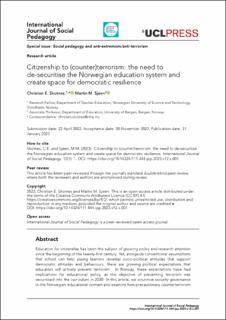| dc.contributor.author | Skotnes, Christian Engen | |
| dc.contributor.author | Sjøen, Martin Meggele | |
| dc.date.accessioned | 2023-06-20T10:49:45Z | |
| dc.date.available | 2023-06-20T10:49:45Z | |
| dc.date.created | 2023-02-01T10:21:03Z | |
| dc.date.issued | 2023 | |
| dc.identifier.issn | 2051-5804 | |
| dc.identifier.uri | https://hdl.handle.net/11250/3072259 | |
| dc.description.abstract | Education for citizenship has been the subject of growing policy and research attention since the beginning of the twenty-first century. Yet, alongside conventional assumptions that school can help young learners develop socio-political attitudes that support democratic attitudes and behaviours, there are growing political expectations that educators will actively prevent terrorism. In Norway, these expectations have had implications for educational policy, as the objective of preventing terrorism was securitised into the curriculum in 2020. In this article, we scrutinise security governance in the Norwegian educational domain and examine how precautionary counterterrorism logic can cause harmful and exclusionary pedagogical practices. Through a detailed qualitative research, we demonstrate that pedagogical practices emphasising democratic resilience could be a promising approach to counter conflict, extremism and violence. Additionally, it is our contention that democratic resilience may also have a de-securitising effect by allowing for peacebuilding to be carried out within the normal rules and regulations of democratic education. In this regard, de-securitisation can allow for mobilising students for peaceful and democratic ends in and beyond education. | en_US |
| dc.language.iso | eng | en_US |
| dc.publisher | UCL Press | en_US |
| dc.rights | Navngivelse 4.0 Internasjonal | * |
| dc.rights.uri | http://creativecommons.org/licenses/by/4.0/deed.no | * |
| dc.title | Citizenship to (counter)terrorism: The need to de-securitise the Norwegian education system and create space for democratic resilience | en_US |
| dc.type | Journal article | en_US |
| dc.type | Peer reviewed | en_US |
| dc.description.version | publishedVersion | en_US |
| dc.rights.holder | Copyright 2023 The Author(s) | en_US |
| dc.source.articlenumber | 1 | en_US |
| cristin.ispublished | true | |
| cristin.fulltext | original | |
| cristin.qualitycode | 1 | |
| dc.identifier.doi | 10.14324/111.444.ijsp.2023.v12.x.001 | |
| dc.identifier.cristin | 2121588 | |
| dc.source.journal | International journal of social pedagogy | en_US |
| dc.identifier.citation | International journal of social pedagogy. 2023, 12 (1), 1. | en_US |
| dc.source.volume | 12 | en_US |
| dc.source.issue | 1 | en_US |

